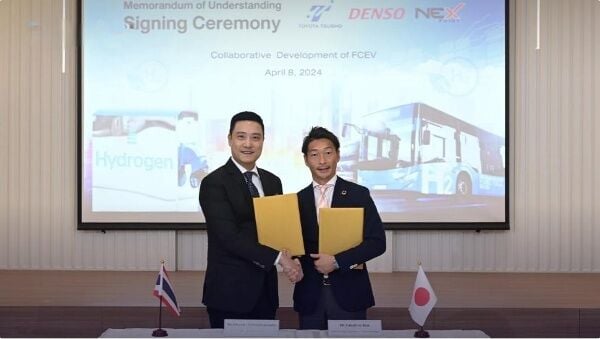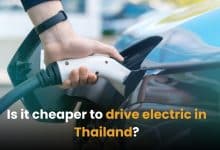Nex Point Plc and Toyota Group unveil hydrgen-powered trucks

In a move towards greener transportation solutions, commercial electric vehicle (EV) giant Nex Point Plc has joined forces with Toyota Tsusho and Denso from Japan to pioneer hydrogen fuel cell vehicle (FCEV) trucks in Thailand. This groundbreaking memorandum of understanding aims to revolutionise the country’s transport sector and reduce greenhouse gas emissions.
CEO Khanist Srivajiraprabha highlighted the significance of applying hydrogen to commercial vehicles, stating that it enhances their capacity for long-distance travel and contributes to cutting emissions in the transport industry. With the potential to extend the longest distance travelled to 1,000 kilometres compared to 300 kilometres with batteries alone, the project promises a substantial leap forward.
“This collaboration not only tackles emissions but also addresses safety concerns associated with hydrogen.”
Acknowledging challenges such as the scarcity of hydrogen stations and high production costs, Khanist expressed confidence in the willingness of state entities like PTT to invest in hydrogen infrastructure given the demand.
The ambitious project, spearheaded by Nex Point, is set to deliver Thailand’s first FCEV truck prototype by the end of the year, with trials scheduled to commence in May 2025. Toyota Tsusho will oversee the development and supply of hydrogen-related components, while Denso will focus on specifications and evaluation. Nex Point will ensure the prototype meets stringent standards.
Takahiro Arai, the general manager of Toyota Tsusho, lauded the initiative, foreseeing a brighter environmental future for Thailand. Higashijima Hayato, from Toyota Tsusho, underscored the potential of hydrogen to significantly reduce emissions in the transport sector.
Hydrogen’s inclusion in Thailand’s National Energy Plan reflects a strategic approach to complement renewable energies, addressing their inherent limitations. However, the transition faces hurdles, primarily concerning production costs, reported The Nation.
Despite challenges, experts anticipate that technological advancements will drive down costs, making hydrogen a viable energy source for Thailand’s sustainable future.
In related news, the Electricity Generating Authority of Thailand, the Office of the Eastern Economic Corridor Policy Committee, and the Thai Department of Energy Business signed a Memorandum of Understanding on April 1 concerning a comprehensive electric charging station project within Thailand’s Eastern Economic Corridor (EEC).
Latest Thailand News
Follow The Thaiger on Google News:


























